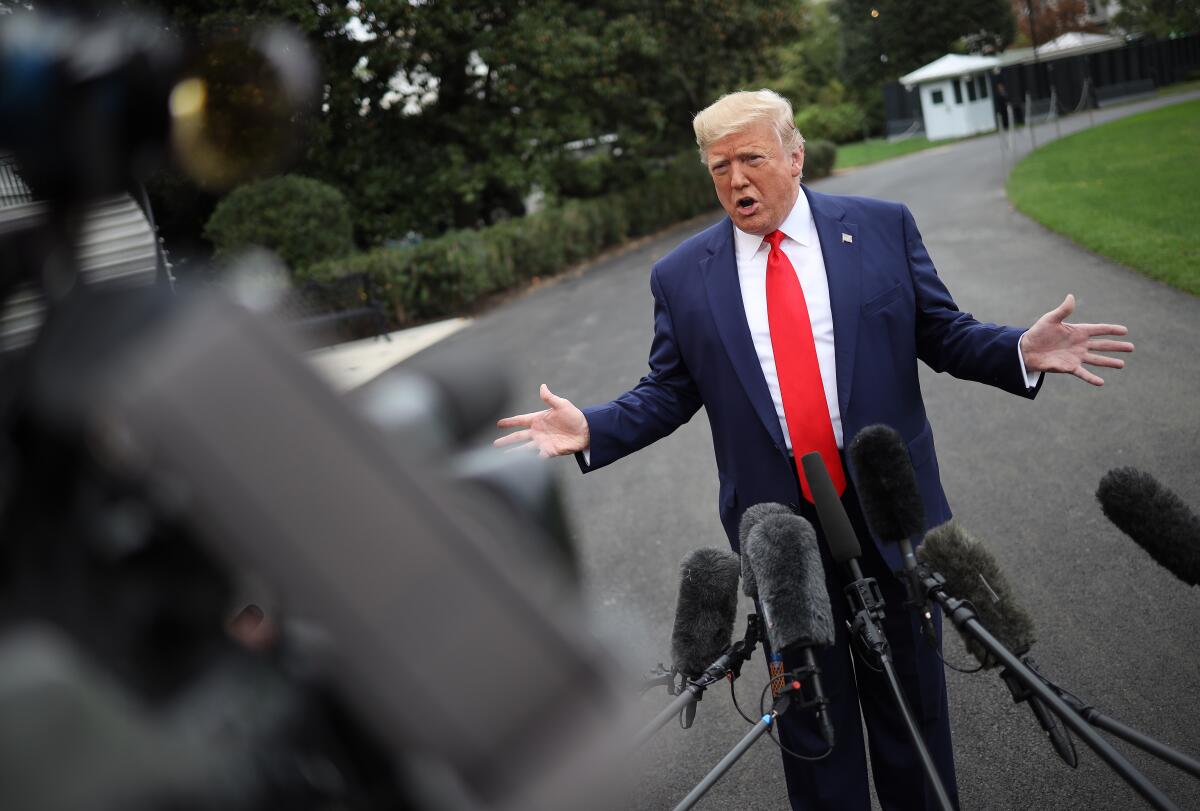Who blew the whistle on Trump? It doesn’t matter

- Share via
President Trump can’t help himself. Whenever he’s confronted with his own misbehavior, he lashes out aggressively at those who have had the temerity to question him. Witness, for example, Special Counsel Robert S. Mueller III’s investigation, which documented disturbingly real efforts by Russia to alter the course of a U.S. presidential election — in Trump’s telling, the meddling was nothing but a hoax and the investigation a witchhunt perpetrated on the country by his enemies, who need to be punished for it.
So it is with the House impeachment inquiry, which House Speaker Nancy Pelosi (D-San Francisco) launched after lawmakers learned that Trump may have pressured Ukrainian President Volodymyr Zelensky in July to investigate former Vice President Joe Biden. Trump has gone on the offensive, calling for the whistleblower who brought this episode to Congress’ attention to be outed rather than addressing the implications of leaning on a vulnerable ally to assist in his reelection campaign.
“I think that the whistleblower gave a lot of false information. And you have to see who the whistleblower is,” Trump told reporters Monday, reiterating a point he’d made earlier in the day on Twitter. His supporters have joined the push to unmask the whistleblower, who Trump has called “an Obama guy,” with some GOP congressmen and right-leaning media going so far as to float the name of a person they suspect of being the whistleblower. These efforts have drawn complaints from the whistleblower’s lawyers, who say their client’s life is being put in danger. Federal law protects whistleblowers from reprisals at work, but it doesn’t guarantee them anonymity.
But Trump is fighting the wrong battle. The core accusations in the whistleblower’s complaint have been confirmed by the reconstructed transcript of Trump’s call with Zelensky and by the testimony of numerous witnesses before the House. The House started releasing transcripts of those depositions Monday, so more details will be available with each passing day. As Trump himself noted when the complaint was released, the whistleblower was operating mainly on hearsay. The case against the president will rise or fall on the strength of the testimony being gathered from people with direct knowledge of what Trump said and did, regardless of the motives of the whistleblower who started the ball rolling.
Trump has made it clear since he assumed office that he does not consider any form of oversight to be valid; it’s all a form of political harassment perpetrated by Democrats and Republican “Never Trumpers.” His attacks on the whistleblower are from that same playbook. But as the evidence amasses about the July 25 call and the supporting efforts by Trump’s lawyer Rudy Giuliani to pressure Ukraine into opening a politically motivated investigation, the original whistleblower has become a non-factor in the inquiry. The only thing Trump accomplishes by threatening to out the whistleblower is to intimidate others into silence. Perhaps that’s the goal.
More to Read
A cure for the common opinion
Get thought-provoking perspectives with our weekly newsletter.
You may occasionally receive promotional content from the Los Angeles Times.









